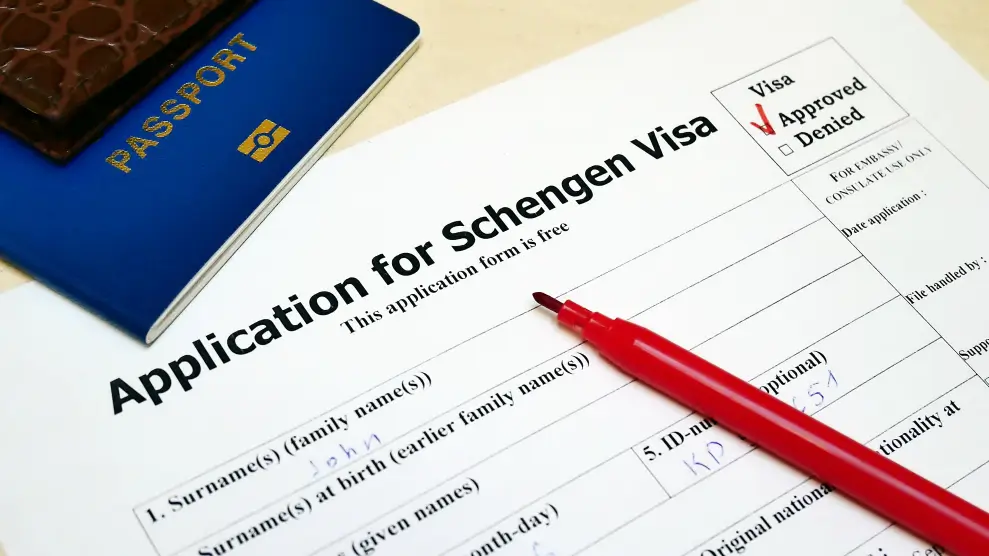Know Your Chances of Obtaining a German Visa

Tina

A German visa allows you to enter and stay in Germany for a certain period. Nationals from more than 100 countries need a German visa to enter the country. You do not need a German visa if you are a citizen of a country with a visa waiver agreement with Germany. Also, a valid residence permit or a Schengen visa issued by any Schengen country allows you entry into Germany.
Table Of Contents
- Schengen visa
- German national visas
- How to see your chances of obtaining a German visa
- Leverage your prospects for a successful visa application
- Takeaway
Schengen visa
In 2022, Germany issued over 820,000 Schengen visas to people from different nations across the globe. As the second-largest issuer, Spain gave over 900,000, while France, as the top issuer, granted more than 1.4 million Schengen visas. This visa category permits travel to all 27 Schengen countries, including Germany, for up to 90 days within 180 days.

The Schengen visa serves travelers for tourism, medical treatment, business, and visiting family and friends. If Germany is your primary destination, you should apply for this short-stay visa at a German embassy. In essence, your chances of obtaining a German visa, or any visa for that matter, for any travel purpose will depend on meeting the requirements of that exact purpose.
German national visas
As expected, more people apply for a Schengen visa than a German visa. More than 150,000 German national visas were issued in 2022 for employment, the most popular visa category. Study visas and family reunions with spouses occupy the second position, with each category above 70,000 visa recipients.
Do you want to work, study, start a business, join a family member, get married, and live with your spouse in Germany? If yes, then you'll need a residence permit. If you want to live in Germany as a refugee, you may find it very difficult to obtain a German visa outside the EU that permits you to enter Germany to seek asylum.
An entry visa permits you to enter and stay in Germany for 90 days, while a residence permit allows for an extended stay. Therefore, even individuals from visa-exempt countries must apply for a residence permit before leaving their home country for Germany if the intention is to stay for an extended duration. Find out if you need a German visa to enter the country.
Holding a German residence permit provides you with the same freedom of movement within the Schengen Area as a Schengen visa does for its holder. This means you have the opportunity to travel to 26 other Schengen countries for a period of up to 90 days.
How to see your chances of obtaining a German visa
You'd like to know your chances of getting a German visa and residence permit before trying to obtain one. The best way to know your chances is to take a detailed migration check. Better than knowing your chances is improving them, which is the essence of the detailed check. At the end of the check, you'll see specific and detailed recommendations that will help you improve your chances.
<!-- With optimized chances, you can be sure to meet all the requirements for a specific visa category and consequently be issued a visa. You may start with a [quick check](/quick-check) to have a rough idea of how the detailed check works. The quick check is completely free. The quick and detailed checks are for people who intend to stay in Germany for at least one year. -->When you apply for a German visa, you will, more often than not, be issued an entry visa, and when you arrive in Germany, the residence permit you already applied for in your home country will be issued.
Leverage your prospects for a successful visa application
Tens of thousands of people get denied a German visa, not necessarily because their chances of obtaining one were low, but due to making one or several avoidable errors or missteps. If you want to study in Germany, see the eight mistakes to avoid.
Providing each document in the list of requirements for a specific visa is crucial but not the only factor to success. Undoubtedly, you could have a good chance of obtaining a German visa for more than one visa category, which could call for a decision on what to apply for. For assistance with choosing what category of German visa to apply for, consider booking an appointment with a migration consultant to help you make an informed decision on the best migration path for you to take.
Your conduct and responses during the visa interview play a significant role in the success of your visa application. Time and time again, people have provided all the required documentation, but some flubs led to disqualification. It's essential to be well-prepared and provide responses that align with your documentation to eliminate any doubts regarding the sincerity of your purpose. We invite you to join our webinar on visa interview coaching for intensive preparation.
Takeaway
As a citizen of a non-EU country, you'll need a residence permit to stay in Germany, even though you may not need a German visa to enter the country.
When you need to apply for a German visa, assessing your approval prospects is crucial to avoid wasting time and resources on unsuccessful applications. Many applicants who, unfortunately, face denials often do so due to non-compliance with the requirements. The reassuring news is that you can readily conduct an assessment to determine and, more importantly, enhance your visa approval prospects.
